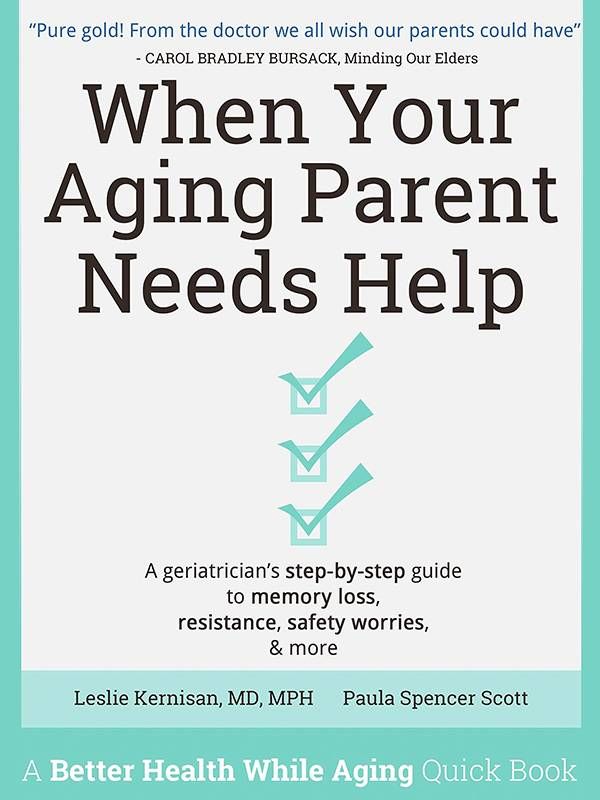The Best Mindset for Helping an Aging Parent
This excerpt from "When Your Aging Parent Needs Help" recommends being clear about what your role is — and isn’t
We call it the big uh-oh: You're concerned about your older parent and unsure what to do next. It can dawn slowly or happen fast with a single life-changing event. Is your mom or dad still safe living alone? Is their bad driving putting others at risk? Is it just forgetfulness or could it be Alzheimer's? Why won't they listen to your suggestions?

Whatever your parent's mental capacity and whatever the legal tools at your disposal, an ongoing struggle will be how to help your parent while preserving his or her autonomy and dignity as much as possible.
Although this may feel like the right thing to do, it can also feel like a tall order.
It's not your job to make everything perfect — or even better — for your parent.
The burden on families in helping aging adults today is huge. There's no single silver bullet to solve most situations, no magic phone call that will make your parent safe and cared for plus happy to accept the help. As you'll soon discover, if you haven't already, there's no well-organized "system" in place to help organize and address elder care needs. In many areas, it's hard to even find the kinds of resources that can help.
Even when you have resources available and experts to help you navigate them, it can be an agonizing challenge to walk the line between respecting your parent's judgments or wishes and giving yourself peace of mind.
So, it's important to realize: You won't always be able to help them in ways that they — or others — might like. And you won't always be able to get them the outcome that you want for them or even the outcome that they might want for themselves.
All of which is why we want to you to keep coming back to a few key ideas as you journey through this part of your parent's life.
Ultimately, this is your role in a nutshell:
- To research problems and possible ways to face them
- To make the effort to understand your parent’s preferences, priorities, goals and desires (even if you can’t always meet them)
- To consider how to proceed in light of what you’ve learned
- To propose and encourage solutions in the most skillful and compassionate way you can
- To provide emotional support to help your parent cope with whatever happens
- To take care of yourself, to be best equipped physically, mentally and emotionally to do all of the above

What your role isn't: Your role isn't to fix everything to your satisfaction or to keep your parent as safe as possible, because those goals aren't usually feasible, permanent or possible.
What this means:
You will periodically need to untangle what you need from what your parent needs. Most of us have a natural tendency to want, or to even expect others, to "do what's good for them." Or to accept needed changes. Or we want things to stay the same forever. That's human nature. The more productive — and infinitely more peaceful — course is to accept that sometimes things are just the way they are and that we have to change ourselves (adjust our preferences, modify our expectations, let go of rigid ideas) rather than trying to force others to bend to our way.
There's no absolute hierarchy of what's most important in a situation. You might think it's keeping Mom or Dad safe. But at what cost? Your parent might put a higher value on having a sense of freedom or control and be willing to accept a certain amount of risk. How a decision gets made can come down to capacity. Even then, though, deciding the priorities usually involves a fair amount of compromise all around.
You won't be able to control everything (or everyone) to your highest satisfaction. Helping an older parent usually involves some degree of acceptance and letting go. This can mean settling for situations that aren't ideal or that you know are only temporary. And that might have consequences down the road, requiring you to "pick up the pieces" later.
You may need to settle for incremental progress. Another way of looking at the point above: Winning your parent's confidence in, or acceptance of, small changes may make larger ones more possible later. Sometimes it pays to tackle relatively easy "low-hanging fruit" first, even if it's only a small or temporary part of a solution.
You'll want to set boundaries for yourself as you go. Unless you've been named in legal documents, your obligation to help your parent is a moral one rather than a legal one. You want to do right by your parent to the best of your ability. But you can only do what you can do.
The most realistic (and satisfying) mindset is to think of your role as accompanying your parent on a journey, to the best of your ability, rather than getting them to a particular destination.
Helping your older parent through this phase of life is a huge role whether you've undertaken it willingly or not.
Throughout, remember this: It's not your job to make everything perfect — or even better — for your parent. As we've seen, those goals are often just not possible no matter what you do.
Your responsibility is to care and to make a good effort to help.
(You can find out the specific six key steps Dr. Kernisan recommends for lending your support a way that's both respectful and effective in her article 6 steps to take when aging parents need help—even if they're resisting.)
Excerpted with permission from "When Your Aging Parent Needs Help: A Geriatrician's Step-By-Step Guide to Memory Loss, Resistance, Safety Worries & More" by Leslie Kernisan, MD, MPH, and Paula Spencer Scott (Better Health While Aging Books, February 2021).


Read More

